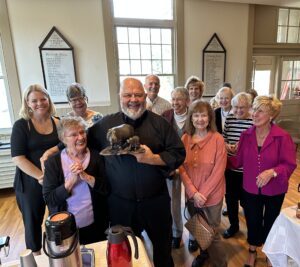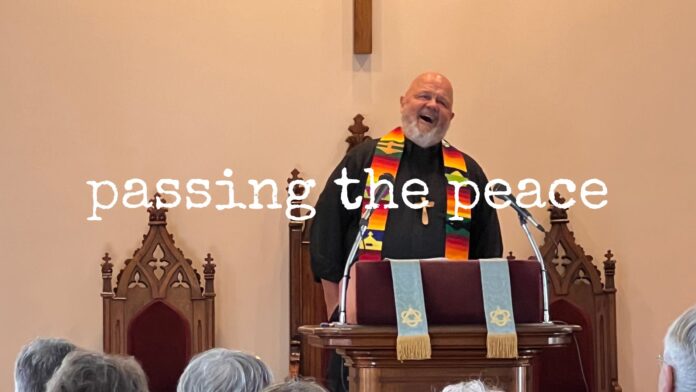The first Sunday in October is World Communion Sunday for the denominations that observe it, which carries its own irony, I suppose. Any reason to celebrate more people at the table is good news to me. This year, the first Sunday in October also marked the date of my official installation as the Minister of Mount Carmel Congregational Church in Hamden, Connecticut. Though I have been there since January, and have been the minister since April, the UCC does an installation after the church and the pastor have had time to get to know each other. And it shows that we are well acquainted. The installation gift from the church was a hippo statue. Here is my sermon from Sunday.
of my official installation as the Minister of Mount Carmel Congregational Church in Hamden, Connecticut. Though I have been there since January, and have been the minister since April, the UCC does an installation after the church and the pastor have had time to get to know each other. And it shows that we are well acquainted. The installation gift from the church was a hippo statue. Here is my sermon from Sunday.
___________________________
As you probably noticed, both of our scripture passages today came from Paul’s letters—one to Galatia and one to Philippi. Both were churches he had visited, and his words to them were written to encourage them from afar. Even in the early days of Christianity, where two or three were gathered meant there were a variety of opinions and preferences. That was not a bad thing necessarily, but it did mean they had to be committed to being together. That is still true.
I am going to do the scripture reading a bit differently this morning. As we look at what Paul had to say in Philippians 2:1-12, let’s start at the end of our passage. Look at the first sentence of the last paragraph:
What I’m getting at, friends, is that you should simply keep on doing what you’ve done from the beginning.
Hold that tone of encouragement in your mind, and go back to the first paragraph:
If you’ve gotten anything at all out of following Christ, if his love has made any difference in your life, if being in a community of the Spirit means anything to you, if you have a heart, if you care—then do me a favor: Agree with each other, love each other, be deep-spirited friends. Don’t push your way to the front; don’t sweet-talk your way to the top. Put yourself aside, and help others get ahead. Don’t be obsessed with getting your own advantage. Forget yourselves long enough to lend a helping hand.
It sounds like he is imploring them, almost pleading—until we put it alongside of him saying, “Just keep doing what you are doing.” It wasn’t that he thought they were clueless as much as he knew they needed to be reminded, as the gospel cliché goes, “who they were and whose they were.”
What reads as our middle paragraph was most likely the text to a hymn of the early church, so think of “O For a Thousand Tongues to Sing,” or “How Great Thou Art” as we read those verses—this time from a translation that gives a better sense of the poetry:
Adopt the attitude that was in Christ Jesus:
Though he was in the form of God,
he did not consider being equal with God something to exploit.
But he emptied himself
by taking the form of a slave
and by becoming like human beings.
When he found himself in the form of a human,
he humbled himself by becoming obedient to the point of death,
even death on a cross.
Therefore, God highly honored him
and gave him a name above all names,
so that at the name of Jesus everyone
in heaven, on earth, and under the earth might bow
and every tongue confess
that Jesus Christ is Lord, to the glory of God
Can you hear it? The language is full of big imagery, as well as Paul’s central idea: Jesus didn’t live just to get what he justly deserved; he lived to love those around him. I wish we knew the melody. Paul wanted the Philippians to hear the ways their lives sang already.
What I’m getting at, friends, is that you should simply keep on doing what you’ve done from the beginning. When I was living among you, you lived in responsive obedience. Now that I’m separated from you, keep it up. Better yet, redouble your efforts. Be energetic in your life of salvation, reverent and sensitive before God. That energy is God’s energy, an energy deep within you, God willing and working at what will give God the most pleasure.
It is as though Paul was saying, “You know the song by heart; keep living out the melody of love.”
For 266 years people have been singing the Mount Carmel version of that melody and passing it on to those who came after them. The surroundings of our church have changed—more than once, I assume—and people have continued to gather here to care for each other and the community. I am grateful that I get to join the chorus. I am glad to be here with you.
The pace of change feels like it has accelerated—not just here in Hamden, but all over the world. The pandemic years has left us all a bit disoriented, a bit out of sync with the melody of love that we thought we knew. We don’t have an actual way to know how the stresses of our lives compare to those who preceded us—and remember what we said last week about comparison being the thief of joy.
This church was born out of change. The folks who gathered at Bellamy’s Tavern to petition for a congregation to be established did so because they didn’t want to have to travel to New Haven or North Haven for services. Their primary concern was not that they would be here in four hundred years; they were taking care of their community.
As we come to the Communion Table together, we get a physical image of the unbroken line that runs back to that tavern, and even back to Philippi. We are participants in a legacy of love.
We don’t know what lies ahead. We can see where we have been, but we can’t see what is coming, which means sometimes our fear can get the best of us—we start worrying about ourselves and we loose track the melody of love. So Paul reminds us,
What I’m getting at, friends, is that you should simply keep on doing what you’ve done from the beginning.
One of the ways we can hear his words—Agree with each other, love each other, be deep-spirited friends. Don’t push your way to the front; don’t sweet-talk your way to the top. Put yourself aside, and help others get ahead. Don’t be obsessed with getting your own advantage. Forget yourselves long enough to lend a helping hand.—is to not let self-preservation become the primary focus of our being together.
The point of life together in Christ is being together.
Today we mark World Communion Sunday. It is not an old celebration. It began in 1933 at a Presbyterian Church in Pittsburg. A minister named Hugh Kerr came up with the idea as a way to promote Christian unity. It didn’t really catch on until after World War II when we began to realize how capable we are of killing ourselves with conflict.
The name is aspirational. Not all denominations participate, so—on World Communion Sunday—a good part of the world is not joining in. And a whole bunch of people are—that’s the story worth telling. All across the globe people are sharing in this meal and reminding one another to keep doing what we have done from the beginning, which is to love one another. Come, let us go to the Table.
Peace,
Milton

Thanks for the poetry of thought and mission Milton. Congratulations on officially becoming the pastor at Mount Carmel! May the movement of holiness and love continue. Peace and love to you Milton!